Core Concepts and Separation of Powers in the New Zealand Government
VerifiedAdded on 2022/08/21
|8
|2111
|17
Essay
AI Summary
This essay delves into the fundamental concepts underpinning the New Zealand government, examining its structure as a unitary parliamentary representative democracy and a constitutional monarchy. It explores the three branches of government—Legislature, Executive, and Judiciary—and their respective roles, emphasizing the separation of powers. The essay discusses the concept of 'Responsible Government' and its application in NZ, highlighting the roles of Parliament, the Executive, and the Judiciary. The paper examines the separation of powers within the NZ democratic system, assessing its relevance in contemporary times, considering issues like anti-terrorist measures and regional-level governmental changes, concluding that the separation of powers is vital for the NZ democratic system. The essay also references relevant legal frameworks, constitutional conventions, and contemporary events impacting the governmental system.
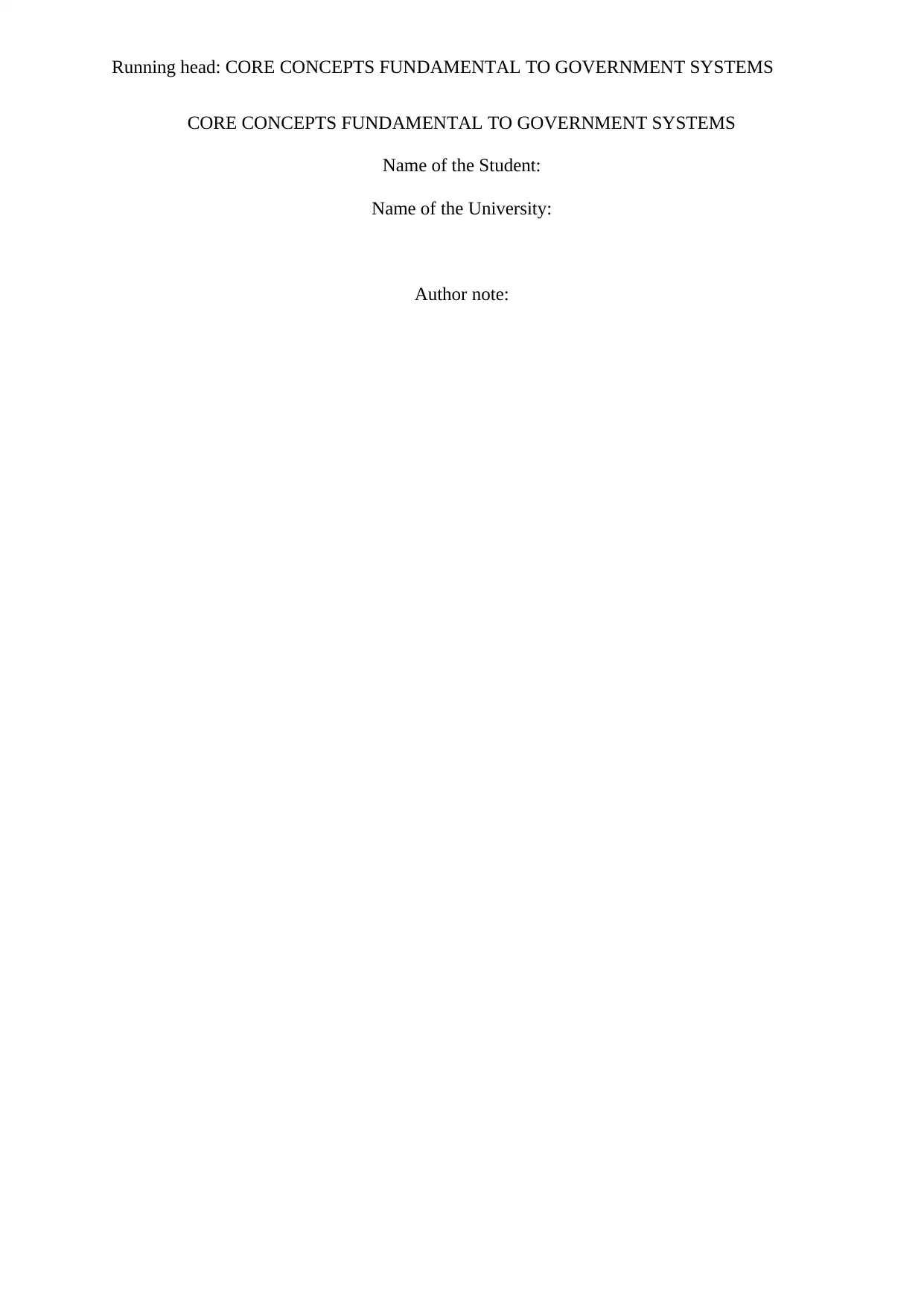
Running head: CORE CONCEPTS FUNDAMENTAL TO GOVERNMENT SYSTEMS
CORE CONCEPTS FUNDAMENTAL TO GOVERNMENT SYSTEMS
Name of the Student:
Name of the University:
Author note:
CORE CONCEPTS FUNDAMENTAL TO GOVERNMENT SYSTEMS
Name of the Student:
Name of the University:
Author note:
Paraphrase This Document
Need a fresh take? Get an instant paraphrase of this document with our AI Paraphraser
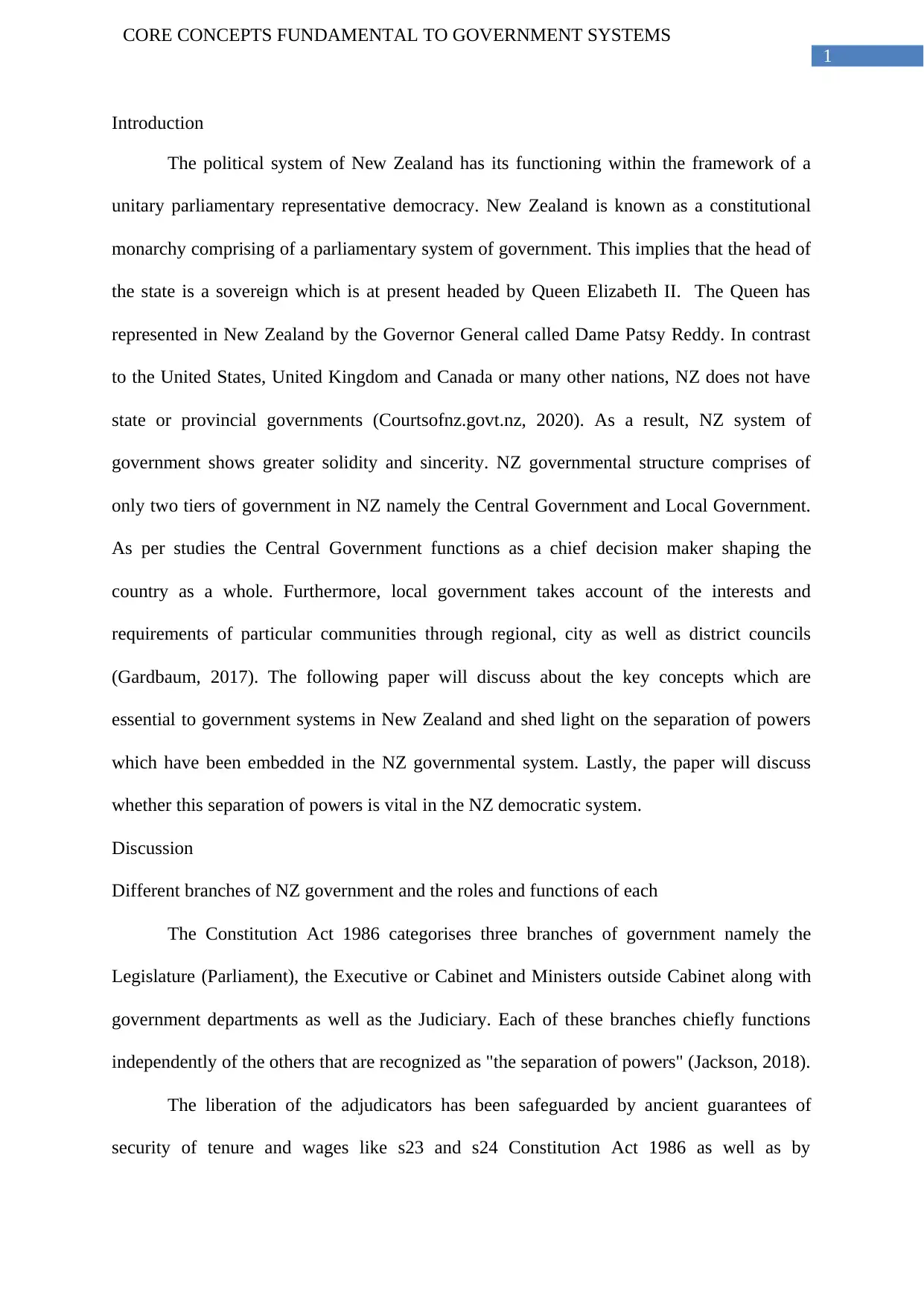
1
CORE CONCEPTS FUNDAMENTAL TO GOVERNMENT SYSTEMS
Introduction
The political system of New Zealand has its functioning within the framework of a
unitary parliamentary representative democracy. New Zealand is known as a constitutional
monarchy comprising of a parliamentary system of government. This implies that the head of
the state is a sovereign which is at present headed by Queen Elizabeth II. The Queen has
represented in New Zealand by the Governor General called Dame Patsy Reddy. In contrast
to the United States, United Kingdom and Canada or many other nations, NZ does not have
state or provincial governments (Courtsofnz.govt.nz, 2020). As a result, NZ system of
government shows greater solidity and sincerity. NZ governmental structure comprises of
only two tiers of government in NZ namely the Central Government and Local Government.
As per studies the Central Government functions as a chief decision maker shaping the
country as a whole. Furthermore, local government takes account of the interests and
requirements of particular communities through regional, city as well as district councils
(Gardbaum, 2017). The following paper will discuss about the key concepts which are
essential to government systems in New Zealand and shed light on the separation of powers
which have been embedded in the NZ governmental system. Lastly, the paper will discuss
whether this separation of powers is vital in the NZ democratic system.
Discussion
Different branches of NZ government and the roles and functions of each
The Constitution Act 1986 categorises three branches of government namely the
Legislature (Parliament), the Executive or Cabinet and Ministers outside Cabinet along with
government departments as well as the Judiciary. Each of these branches chiefly functions
independently of the others that are recognized as "the separation of powers" (Jackson, 2018).
The liberation of the adjudicators has been safeguarded by ancient guarantees of
security of tenure and wages like s23 and s24 Constitution Act 1986 as well as by
CORE CONCEPTS FUNDAMENTAL TO GOVERNMENT SYSTEMS
Introduction
The political system of New Zealand has its functioning within the framework of a
unitary parliamentary representative democracy. New Zealand is known as a constitutional
monarchy comprising of a parliamentary system of government. This implies that the head of
the state is a sovereign which is at present headed by Queen Elizabeth II. The Queen has
represented in New Zealand by the Governor General called Dame Patsy Reddy. In contrast
to the United States, United Kingdom and Canada or many other nations, NZ does not have
state or provincial governments (Courtsofnz.govt.nz, 2020). As a result, NZ system of
government shows greater solidity and sincerity. NZ governmental structure comprises of
only two tiers of government in NZ namely the Central Government and Local Government.
As per studies the Central Government functions as a chief decision maker shaping the
country as a whole. Furthermore, local government takes account of the interests and
requirements of particular communities through regional, city as well as district councils
(Gardbaum, 2017). The following paper will discuss about the key concepts which are
essential to government systems in New Zealand and shed light on the separation of powers
which have been embedded in the NZ governmental system. Lastly, the paper will discuss
whether this separation of powers is vital in the NZ democratic system.
Discussion
Different branches of NZ government and the roles and functions of each
The Constitution Act 1986 categorises three branches of government namely the
Legislature (Parliament), the Executive or Cabinet and Ministers outside Cabinet along with
government departments as well as the Judiciary. Each of these branches chiefly functions
independently of the others that are recognized as "the separation of powers" (Jackson, 2018).
The liberation of the adjudicators has been safeguarded by ancient guarantees of
security of tenure and wages like s23 and s24 Constitution Act 1986 as well as by
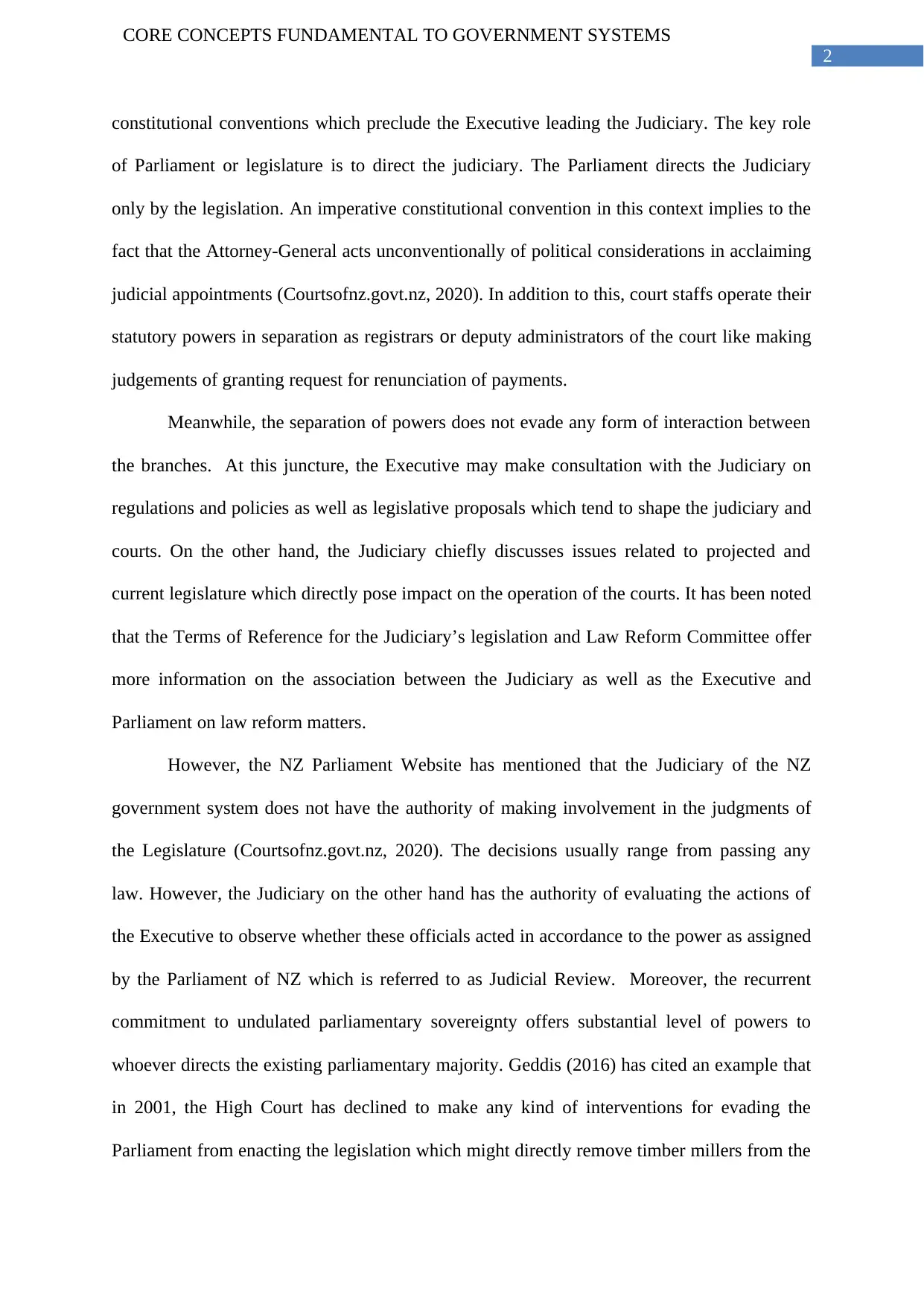
2
CORE CONCEPTS FUNDAMENTAL TO GOVERNMENT SYSTEMS
constitutional conventions which preclude the Executive leading the Judiciary. The key role
of Parliament or legislature is to direct the judiciary. The Parliament directs the Judiciary
only by the legislation. An imperative constitutional convention in this context implies to the
fact that the Attorney-General acts unconventionally of political considerations in acclaiming
judicial appointments (Courtsofnz.govt.nz, 2020). In addition to this, court staffs operate their
statutory powers in separation as registrars or deputy administrators of the court like making
judgements of granting request for renunciation of payments.
Meanwhile, the separation of powers does not evade any form of interaction between
the branches. At this juncture, the Executive may make consultation with the Judiciary on
regulations and policies as well as legislative proposals which tend to shape the judiciary and
courts. On the other hand, the Judiciary chiefly discusses issues related to projected and
current legislature which directly pose impact on the operation of the courts. It has been noted
that the Terms of Reference for the Judiciary’s legislation and Law Reform Committee offer
more information on the association between the Judiciary as well as the Executive and
Parliament on law reform matters.
However, the NZ Parliament Website has mentioned that the Judiciary of the NZ
government system does not have the authority of making involvement in the judgments of
the Legislature (Courtsofnz.govt.nz, 2020). The decisions usually range from passing any
law. However, the Judiciary on the other hand has the authority of evaluating the actions of
the Executive to observe whether these officials acted in accordance to the power as assigned
by the Parliament of NZ which is referred to as Judicial Review. Moreover, the recurrent
commitment to undulated parliamentary sovereignty offers substantial level of powers to
whoever directs the existing parliamentary majority. Geddis (2016) has cited an example that
in 2001, the High Court has declined to make any kind of interventions for evading the
Parliament from enacting the legislation which might directly remove timber millers from the
CORE CONCEPTS FUNDAMENTAL TO GOVERNMENT SYSTEMS
constitutional conventions which preclude the Executive leading the Judiciary. The key role
of Parliament or legislature is to direct the judiciary. The Parliament directs the Judiciary
only by the legislation. An imperative constitutional convention in this context implies to the
fact that the Attorney-General acts unconventionally of political considerations in acclaiming
judicial appointments (Courtsofnz.govt.nz, 2020). In addition to this, court staffs operate their
statutory powers in separation as registrars or deputy administrators of the court like making
judgements of granting request for renunciation of payments.
Meanwhile, the separation of powers does not evade any form of interaction between
the branches. At this juncture, the Executive may make consultation with the Judiciary on
regulations and policies as well as legislative proposals which tend to shape the judiciary and
courts. On the other hand, the Judiciary chiefly discusses issues related to projected and
current legislature which directly pose impact on the operation of the courts. It has been noted
that the Terms of Reference for the Judiciary’s legislation and Law Reform Committee offer
more information on the association between the Judiciary as well as the Executive and
Parliament on law reform matters.
However, the NZ Parliament Website has mentioned that the Judiciary of the NZ
government system does not have the authority of making involvement in the judgments of
the Legislature (Courtsofnz.govt.nz, 2020). The decisions usually range from passing any
law. However, the Judiciary on the other hand has the authority of evaluating the actions of
the Executive to observe whether these officials acted in accordance to the power as assigned
by the Parliament of NZ which is referred to as Judicial Review. Moreover, the recurrent
commitment to undulated parliamentary sovereignty offers substantial level of powers to
whoever directs the existing parliamentary majority. Geddis (2016) has cited an example that
in 2001, the High Court has declined to make any kind of interventions for evading the
Parliament from enacting the legislation which might directly remove timber millers from the
⊘ This is a preview!⊘
Do you want full access?
Subscribe today to unlock all pages.

Trusted by 1+ million students worldwide
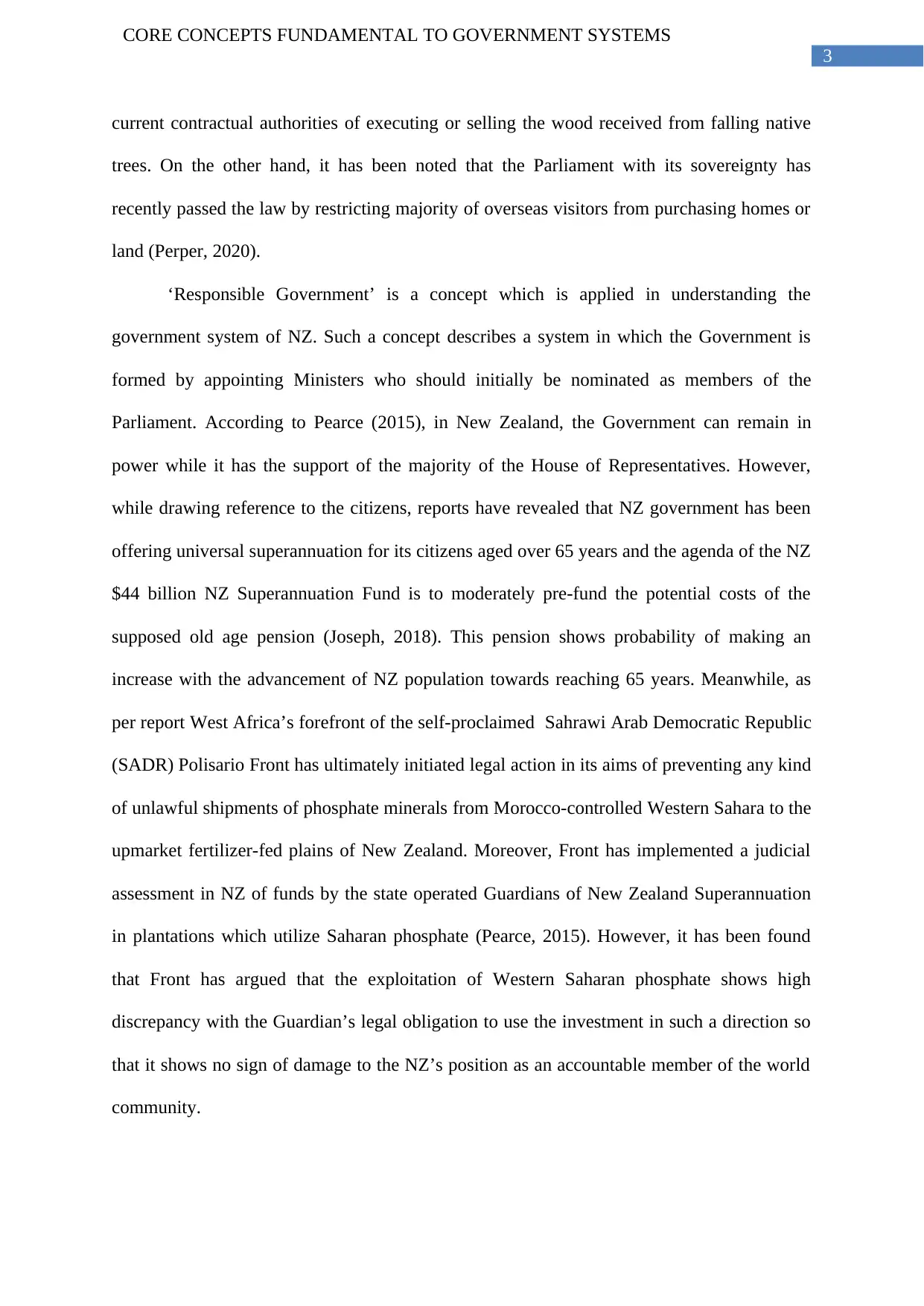
3
CORE CONCEPTS FUNDAMENTAL TO GOVERNMENT SYSTEMS
current contractual authorities of executing or selling the wood received from falling native
trees. On the other hand, it has been noted that the Parliament with its sovereignty has
recently passed the law by restricting majority of overseas visitors from purchasing homes or
land (Perper, 2020).
‘Responsible Government’ is a concept which is applied in understanding the
government system of NZ. Such a concept describes a system in which the Government is
formed by appointing Ministers who should initially be nominated as members of the
Parliament. According to Pearce (2015), in New Zealand, the Government can remain in
power while it has the support of the majority of the House of Representatives. However,
while drawing reference to the citizens, reports have revealed that NZ government has been
offering universal superannuation for its citizens aged over 65 years and the agenda of the NZ
$44 billion NZ Superannuation Fund is to moderately pre-fund the potential costs of the
supposed old age pension (Joseph, 2018). This pension shows probability of making an
increase with the advancement of NZ population towards reaching 65 years. Meanwhile, as
per report West Africa’s forefront of the self-proclaimed Sahrawi Arab Democratic Republic
(SADR) Polisario Front has ultimately initiated legal action in its aims of preventing any kind
of unlawful shipments of phosphate minerals from Morocco-controlled Western Sahara to the
upmarket fertilizer-fed plains of New Zealand. Moreover, Front has implemented a judicial
assessment in NZ of funds by the state operated Guardians of New Zealand Superannuation
in plantations which utilize Saharan phosphate (Pearce, 2015). However, it has been found
that Front has argued that the exploitation of Western Saharan phosphate shows high
discrepancy with the Guardian’s legal obligation to use the investment in such a direction so
that it shows no sign of damage to the NZ’s position as an accountable member of the world
community.
CORE CONCEPTS FUNDAMENTAL TO GOVERNMENT SYSTEMS
current contractual authorities of executing or selling the wood received from falling native
trees. On the other hand, it has been noted that the Parliament with its sovereignty has
recently passed the law by restricting majority of overseas visitors from purchasing homes or
land (Perper, 2020).
‘Responsible Government’ is a concept which is applied in understanding the
government system of NZ. Such a concept describes a system in which the Government is
formed by appointing Ministers who should initially be nominated as members of the
Parliament. According to Pearce (2015), in New Zealand, the Government can remain in
power while it has the support of the majority of the House of Representatives. However,
while drawing reference to the citizens, reports have revealed that NZ government has been
offering universal superannuation for its citizens aged over 65 years and the agenda of the NZ
$44 billion NZ Superannuation Fund is to moderately pre-fund the potential costs of the
supposed old age pension (Joseph, 2018). This pension shows probability of making an
increase with the advancement of NZ population towards reaching 65 years. Meanwhile, as
per report West Africa’s forefront of the self-proclaimed Sahrawi Arab Democratic Republic
(SADR) Polisario Front has ultimately initiated legal action in its aims of preventing any kind
of unlawful shipments of phosphate minerals from Morocco-controlled Western Sahara to the
upmarket fertilizer-fed plains of New Zealand. Moreover, Front has implemented a judicial
assessment in NZ of funds by the state operated Guardians of New Zealand Superannuation
in plantations which utilize Saharan phosphate (Pearce, 2015). However, it has been found
that Front has argued that the exploitation of Western Saharan phosphate shows high
discrepancy with the Guardian’s legal obligation to use the investment in such a direction so
that it shows no sign of damage to the NZ’s position as an accountable member of the world
community.
Paraphrase This Document
Need a fresh take? Get an instant paraphrase of this document with our AI Paraphraser
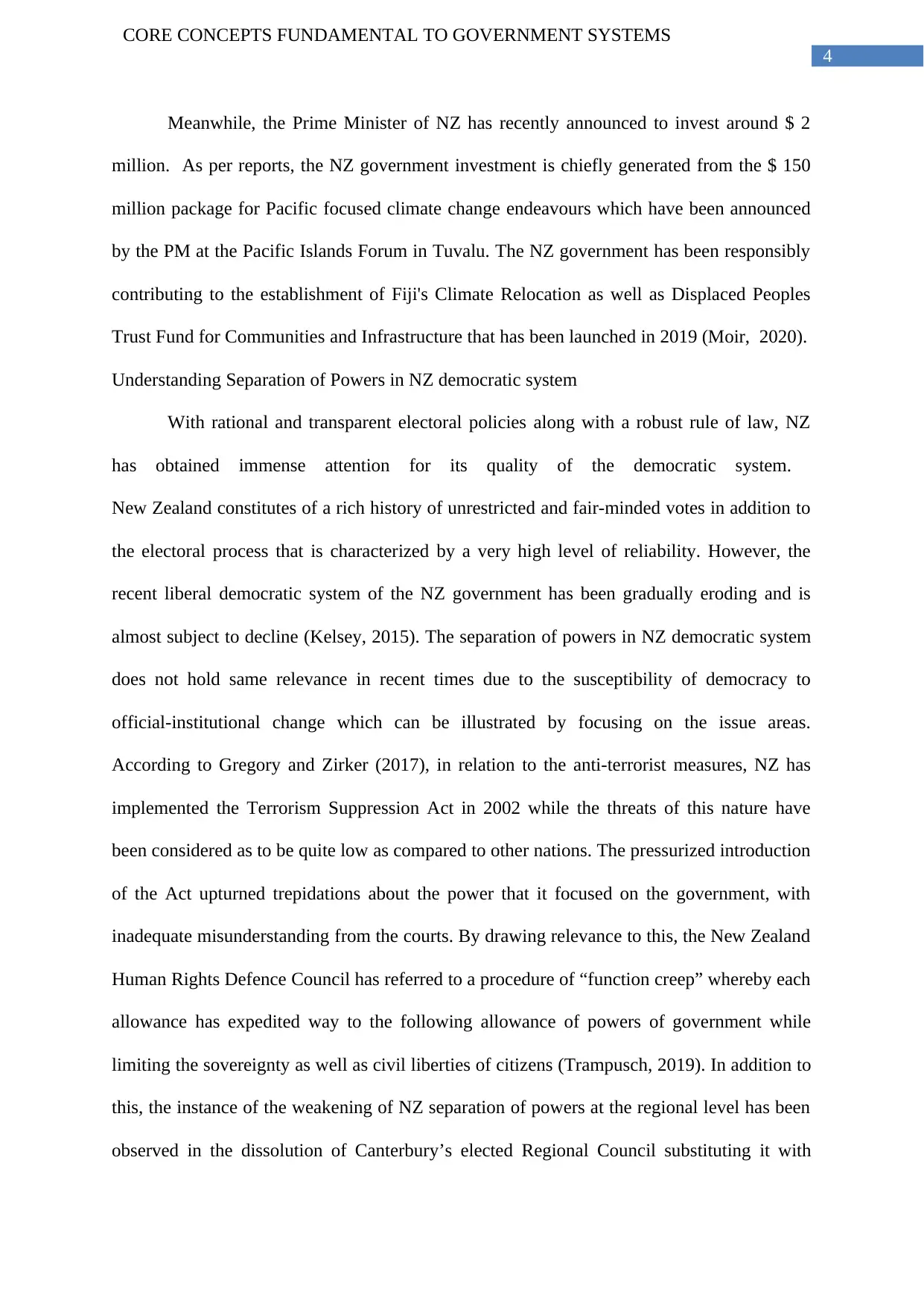
4
CORE CONCEPTS FUNDAMENTAL TO GOVERNMENT SYSTEMS
Meanwhile, the Prime Minister of NZ has recently announced to invest around $ 2
million. As per reports, the NZ government investment is chiefly generated from the $ 150
million package for Pacific focused climate change endeavours which have been announced
by the PM at the Pacific Islands Forum in Tuvalu. The NZ government has been responsibly
contributing to the establishment of Fiji's Climate Relocation as well as Displaced Peoples
Trust Fund for Communities and Infrastructure that has been launched in 2019 (Moir, 2020).
Understanding Separation of Powers in NZ democratic system
With rational and transparent electoral policies along with a robust rule of law, NZ
has obtained immense attention for its quality of the democratic system.
New Zealand constitutes of a rich history of unrestricted and fair-minded votes in addition to
the electoral process that is characterized by a very high level of reliability. However, the
recent liberal democratic system of the NZ government has been gradually eroding and is
almost subject to decline (Kelsey, 2015). The separation of powers in NZ democratic system
does not hold same relevance in recent times due to the susceptibility of democracy to
official-institutional change which can be illustrated by focusing on the issue areas.
According to Gregory and Zirker (2017), in relation to the anti-terrorist measures, NZ has
implemented the Terrorism Suppression Act in 2002 while the threats of this nature have
been considered as to be quite low as compared to other nations. The pressurized introduction
of the Act upturned trepidations about the power that it focused on the government, with
inadequate misunderstanding from the courts. By drawing relevance to this, the New Zealand
Human Rights Defence Council has referred to a procedure of “function creep” whereby each
allowance has expedited way to the following allowance of powers of government while
limiting the sovereignty as well as civil liberties of citizens (Trampusch, 2019). In addition to
this, the instance of the weakening of NZ separation of powers at the regional level has been
observed in the dissolution of Canterbury’s elected Regional Council substituting it with
CORE CONCEPTS FUNDAMENTAL TO GOVERNMENT SYSTEMS
Meanwhile, the Prime Minister of NZ has recently announced to invest around $ 2
million. As per reports, the NZ government investment is chiefly generated from the $ 150
million package for Pacific focused climate change endeavours which have been announced
by the PM at the Pacific Islands Forum in Tuvalu. The NZ government has been responsibly
contributing to the establishment of Fiji's Climate Relocation as well as Displaced Peoples
Trust Fund for Communities and Infrastructure that has been launched in 2019 (Moir, 2020).
Understanding Separation of Powers in NZ democratic system
With rational and transparent electoral policies along with a robust rule of law, NZ
has obtained immense attention for its quality of the democratic system.
New Zealand constitutes of a rich history of unrestricted and fair-minded votes in addition to
the electoral process that is characterized by a very high level of reliability. However, the
recent liberal democratic system of the NZ government has been gradually eroding and is
almost subject to decline (Kelsey, 2015). The separation of powers in NZ democratic system
does not hold same relevance in recent times due to the susceptibility of democracy to
official-institutional change which can be illustrated by focusing on the issue areas.
According to Gregory and Zirker (2017), in relation to the anti-terrorist measures, NZ has
implemented the Terrorism Suppression Act in 2002 while the threats of this nature have
been considered as to be quite low as compared to other nations. The pressurized introduction
of the Act upturned trepidations about the power that it focused on the government, with
inadequate misunderstanding from the courts. By drawing relevance to this, the New Zealand
Human Rights Defence Council has referred to a procedure of “function creep” whereby each
allowance has expedited way to the following allowance of powers of government while
limiting the sovereignty as well as civil liberties of citizens (Trampusch, 2019). In addition to
this, the instance of the weakening of NZ separation of powers at the regional level has been
observed in the dissolution of Canterbury’s elected Regional Council substituting it with
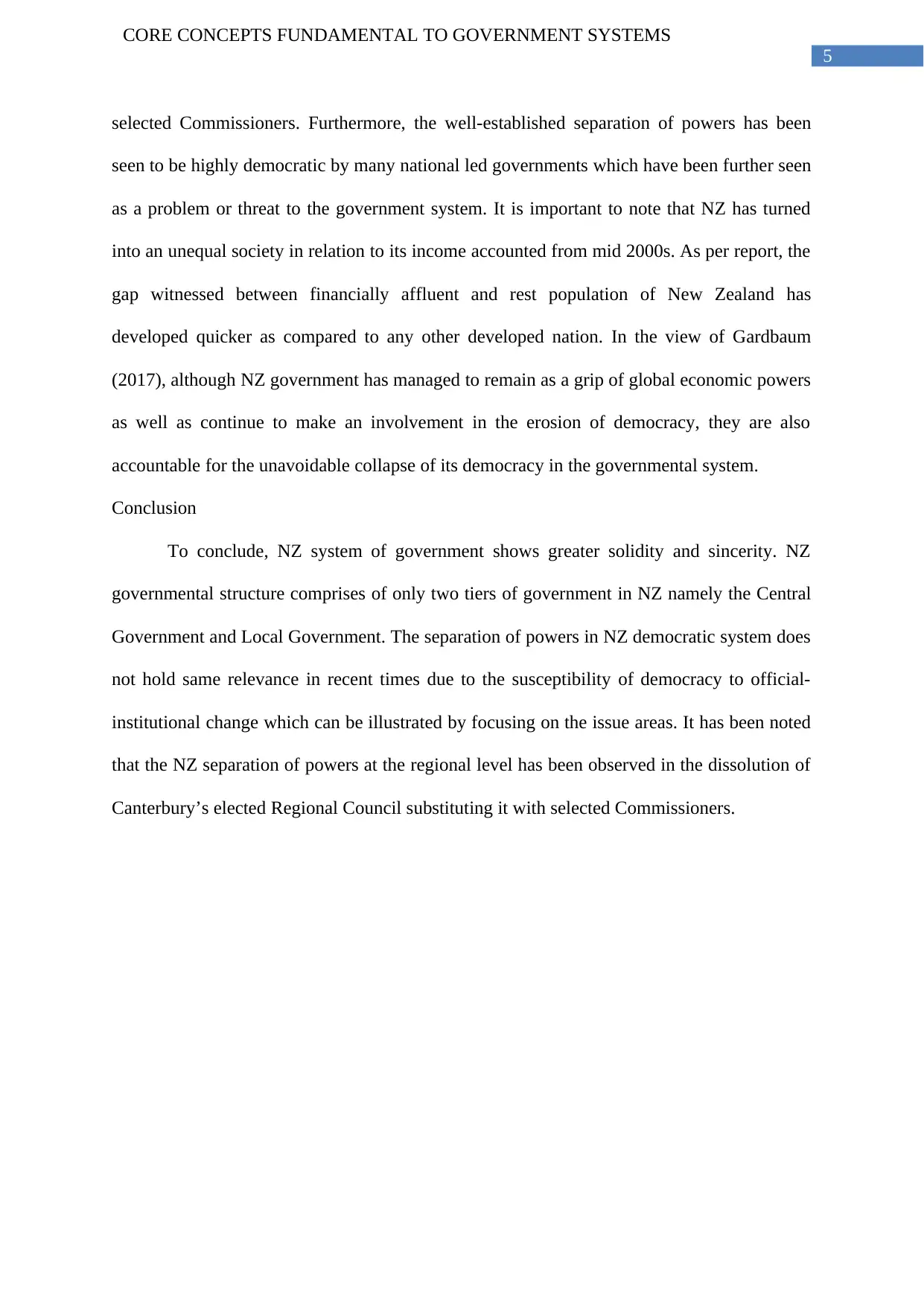
5
CORE CONCEPTS FUNDAMENTAL TO GOVERNMENT SYSTEMS
selected Commissioners. Furthermore, the well-established separation of powers has been
seen to be highly democratic by many national led governments which have been further seen
as a problem or threat to the government system. It is important to note that NZ has turned
into an unequal society in relation to its income accounted from mid 2000s. As per report, the
gap witnessed between financially affluent and rest population of New Zealand has
developed quicker as compared to any other developed nation. In the view of Gardbaum
(2017), although NZ government has managed to remain as a grip of global economic powers
as well as continue to make an involvement in the erosion of democracy, they are also
accountable for the unavoidable collapse of its democracy in the governmental system.
Conclusion
To conclude, NZ system of government shows greater solidity and sincerity. NZ
governmental structure comprises of only two tiers of government in NZ namely the Central
Government and Local Government. The separation of powers in NZ democratic system does
not hold same relevance in recent times due to the susceptibility of democracy to official-
institutional change which can be illustrated by focusing on the issue areas. It has been noted
that the NZ separation of powers at the regional level has been observed in the dissolution of
Canterbury’s elected Regional Council substituting it with selected Commissioners.
CORE CONCEPTS FUNDAMENTAL TO GOVERNMENT SYSTEMS
selected Commissioners. Furthermore, the well-established separation of powers has been
seen to be highly democratic by many national led governments which have been further seen
as a problem or threat to the government system. It is important to note that NZ has turned
into an unequal society in relation to its income accounted from mid 2000s. As per report, the
gap witnessed between financially affluent and rest population of New Zealand has
developed quicker as compared to any other developed nation. In the view of Gardbaum
(2017), although NZ government has managed to remain as a grip of global economic powers
as well as continue to make an involvement in the erosion of democracy, they are also
accountable for the unavoidable collapse of its democracy in the governmental system.
Conclusion
To conclude, NZ system of government shows greater solidity and sincerity. NZ
governmental structure comprises of only two tiers of government in NZ namely the Central
Government and Local Government. The separation of powers in NZ democratic system does
not hold same relevance in recent times due to the susceptibility of democracy to official-
institutional change which can be illustrated by focusing on the issue areas. It has been noted
that the NZ separation of powers at the regional level has been observed in the dissolution of
Canterbury’s elected Regional Council substituting it with selected Commissioners.
⊘ This is a preview!⊘
Do you want full access?
Subscribe today to unlock all pages.

Trusted by 1+ million students worldwide
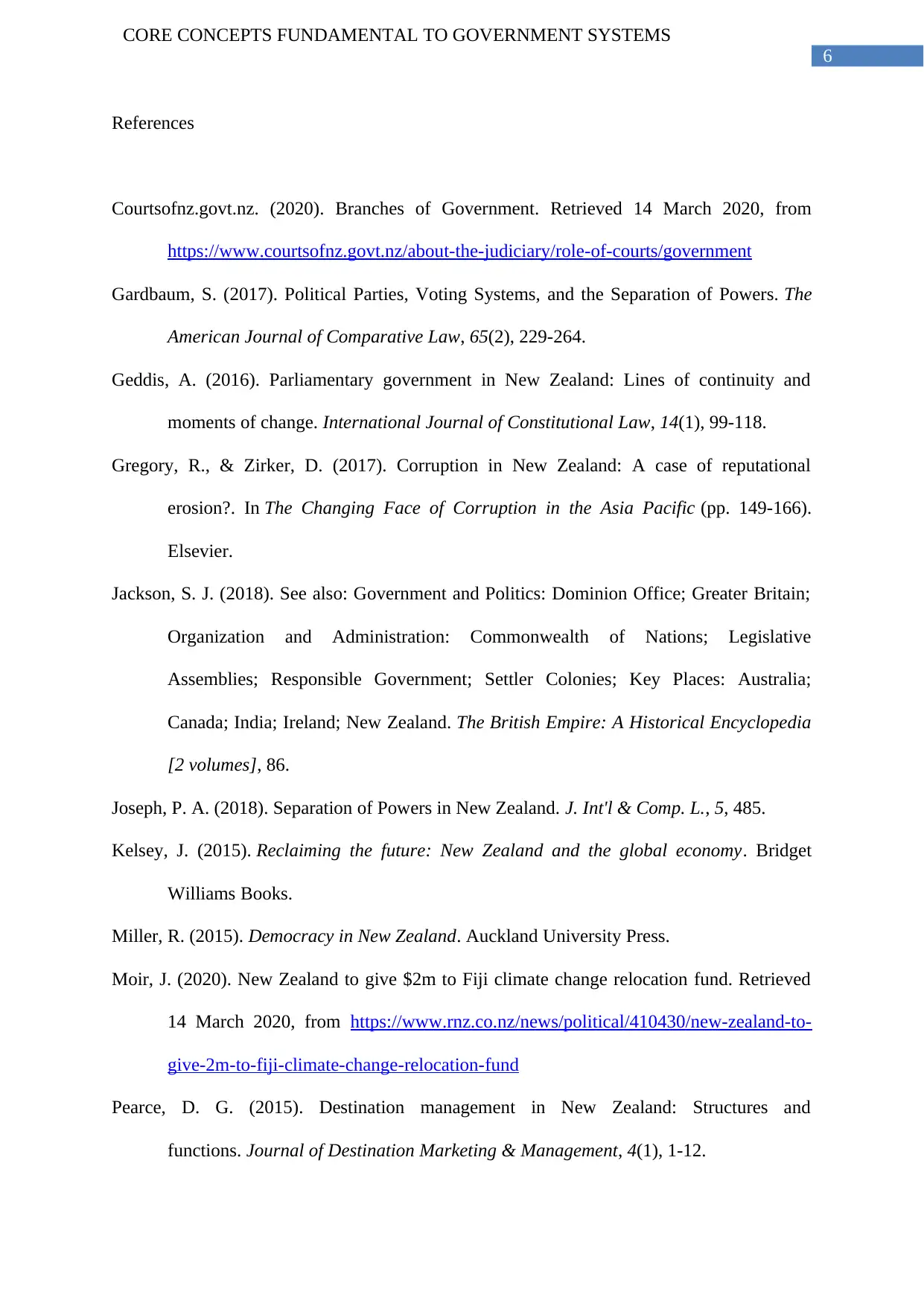
6
CORE CONCEPTS FUNDAMENTAL TO GOVERNMENT SYSTEMS
References
Courtsofnz.govt.nz. (2020). Branches of Government. Retrieved 14 March 2020, from
https://www.courtsofnz.govt.nz/about-the-judiciary/role-of-courts/government
Gardbaum, S. (2017). Political Parties, Voting Systems, and the Separation of Powers. The
American Journal of Comparative Law, 65(2), 229-264.
Geddis, A. (2016). Parliamentary government in New Zealand: Lines of continuity and
moments of change. International Journal of Constitutional Law, 14(1), 99-118.
Gregory, R., & Zirker, D. (2017). Corruption in New Zealand: A case of reputational
erosion?. In The Changing Face of Corruption in the Asia Pacific (pp. 149-166).
Elsevier.
Jackson, S. J. (2018). See also: Government and Politics: Dominion Office; Greater Britain;
Organization and Administration: Commonwealth of Nations; Legislative
Assemblies; Responsible Government; Settler Colonies; Key Places: Australia;
Canada; India; Ireland; New Zealand. The British Empire: A Historical Encyclopedia
[2 volumes], 86.
Joseph, P. A. (2018). Separation of Powers in New Zealand. J. Int'l & Comp. L., 5, 485.
Kelsey, J. (2015). Reclaiming the future: New Zealand and the global economy. Bridget
Williams Books.
Miller, R. (2015). Democracy in New Zealand. Auckland University Press.
Moir, J. (2020). New Zealand to give $2m to Fiji climate change relocation fund. Retrieved
14 March 2020, from https://www.rnz.co.nz/news/political/410430/new-zealand-to-
give-2m-to-fiji-climate-change-relocation-fund
Pearce, D. G. (2015). Destination management in New Zealand: Structures and
functions. Journal of Destination Marketing & Management, 4(1), 1-12.
CORE CONCEPTS FUNDAMENTAL TO GOVERNMENT SYSTEMS
References
Courtsofnz.govt.nz. (2020). Branches of Government. Retrieved 14 March 2020, from
https://www.courtsofnz.govt.nz/about-the-judiciary/role-of-courts/government
Gardbaum, S. (2017). Political Parties, Voting Systems, and the Separation of Powers. The
American Journal of Comparative Law, 65(2), 229-264.
Geddis, A. (2016). Parliamentary government in New Zealand: Lines of continuity and
moments of change. International Journal of Constitutional Law, 14(1), 99-118.
Gregory, R., & Zirker, D. (2017). Corruption in New Zealand: A case of reputational
erosion?. In The Changing Face of Corruption in the Asia Pacific (pp. 149-166).
Elsevier.
Jackson, S. J. (2018). See also: Government and Politics: Dominion Office; Greater Britain;
Organization and Administration: Commonwealth of Nations; Legislative
Assemblies; Responsible Government; Settler Colonies; Key Places: Australia;
Canada; India; Ireland; New Zealand. The British Empire: A Historical Encyclopedia
[2 volumes], 86.
Joseph, P. A. (2018). Separation of Powers in New Zealand. J. Int'l & Comp. L., 5, 485.
Kelsey, J. (2015). Reclaiming the future: New Zealand and the global economy. Bridget
Williams Books.
Miller, R. (2015). Democracy in New Zealand. Auckland University Press.
Moir, J. (2020). New Zealand to give $2m to Fiji climate change relocation fund. Retrieved
14 March 2020, from https://www.rnz.co.nz/news/political/410430/new-zealand-to-
give-2m-to-fiji-climate-change-relocation-fund
Pearce, D. G. (2015). Destination management in New Zealand: Structures and
functions. Journal of Destination Marketing & Management, 4(1), 1-12.
Paraphrase This Document
Need a fresh take? Get an instant paraphrase of this document with our AI Paraphraser
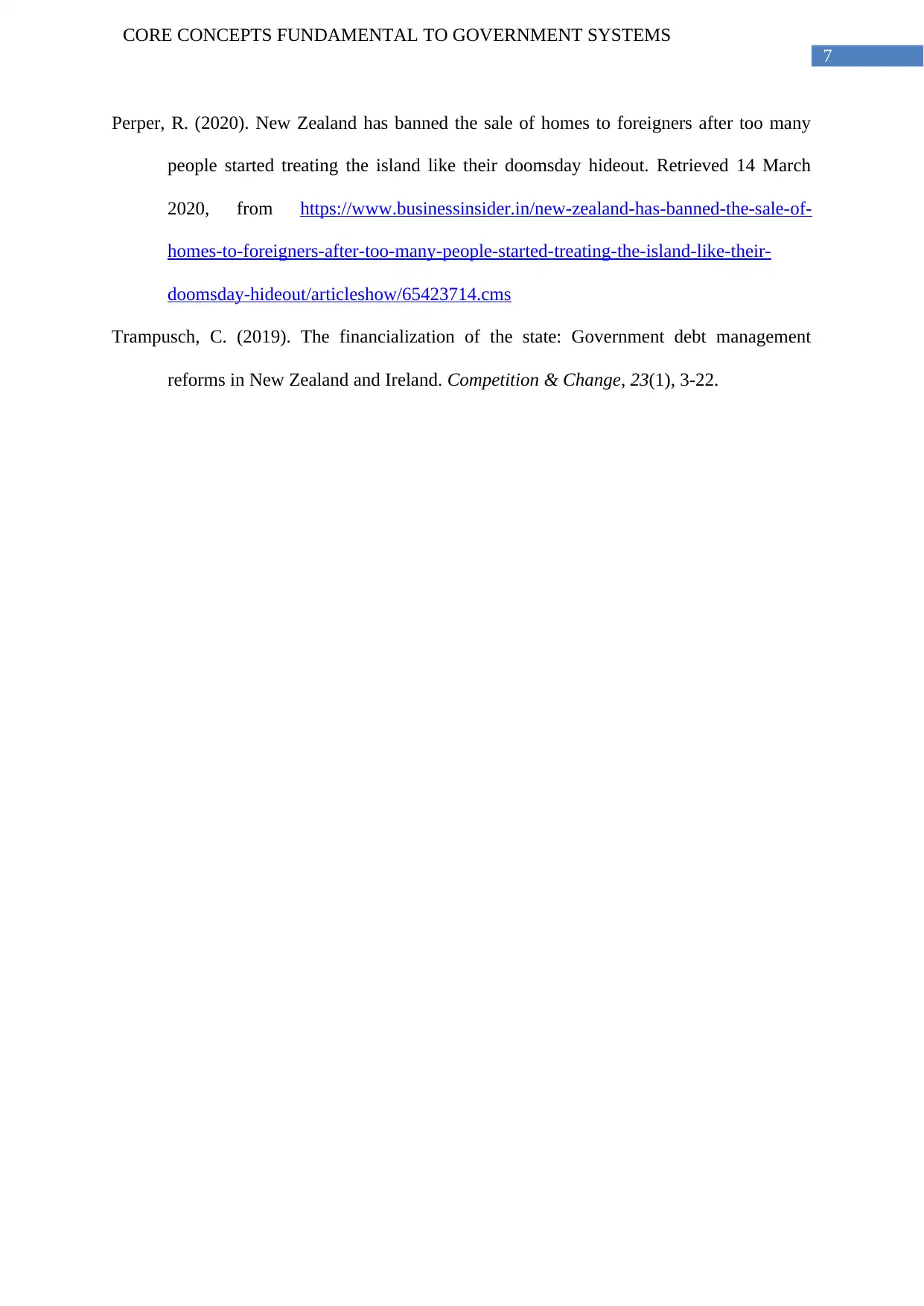
7
CORE CONCEPTS FUNDAMENTAL TO GOVERNMENT SYSTEMS
Perper, R. (2020). New Zealand has banned the sale of homes to foreigners after too many
people started treating the island like their doomsday hideout. Retrieved 14 March
2020, from https://www.businessinsider.in/new-zealand-has-banned-the-sale-of-
homes-to-foreigners-after-too-many-people-started-treating-the-island-like-their-
doomsday-hideout/articleshow/65423714.cms
Trampusch, C. (2019). The financialization of the state: Government debt management
reforms in New Zealand and Ireland. Competition & Change, 23(1), 3-22.
CORE CONCEPTS FUNDAMENTAL TO GOVERNMENT SYSTEMS
Perper, R. (2020). New Zealand has banned the sale of homes to foreigners after too many
people started treating the island like their doomsday hideout. Retrieved 14 March
2020, from https://www.businessinsider.in/new-zealand-has-banned-the-sale-of-
homes-to-foreigners-after-too-many-people-started-treating-the-island-like-their-
doomsday-hideout/articleshow/65423714.cms
Trampusch, C. (2019). The financialization of the state: Government debt management
reforms in New Zealand and Ireland. Competition & Change, 23(1), 3-22.
1 out of 8
Related Documents
Your All-in-One AI-Powered Toolkit for Academic Success.
+13062052269
info@desklib.com
Available 24*7 on WhatsApp / Email
![[object Object]](/_next/static/media/star-bottom.7253800d.svg)
Unlock your academic potential
Copyright © 2020–2026 A2Z Services. All Rights Reserved. Developed and managed by ZUCOL.




